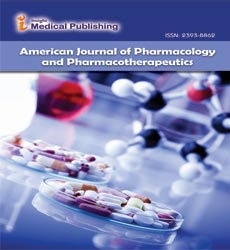ISSN : 2393-8862
American Journal of Pharmacology and Pharmacotherapeutics
Cancer and Persistent Inflammation Disease
Chloe Slaney*
Department of Psychology, University of Bristol, Bristol, UK
- *Corresponding Author:
- Chloe Slaney
Department of Psychology,
University of Bristol, Bristol,
UK,
E-mail: slaney@hotmail.com
Received date: November 18, 2023, Manuscript No. IPAPP-24-18488; Editor assigned date: November 21, 2023, PreQC No. IPAPP-24-18488 (PQ); Reviewed date: December 04, 2023, QC No. IPAPP-24-18488; Revised date: December 11, 2023, Manuscript No. IPAPP-24-18488 (R); Published date: December 18, 2023, DOI: 10.36648/2393-8862.10.4.169
Citation: Slaney C (2023) Cancer and Persistent Inflammation Diseases. Am J Pharmacol Pharmacother Vol.10 No.4: 169.
Description
Cancer, a complex and devastating disease, remains a significant global health challenge. Its development involves a multitude of factors, and emerging research has shed light on the profound relationship between cancer and persistent inflammation. Understanding this intricate connection has become pivotal in advancing both preventive strategies and therapeutic interventions. Inflammation, a fundamental defense mechanism orchestrated by the body in response to infections, injuries, or harmful stimuli, serves as a double-edged sword. Acute inflammation, a transient and localized process, aids in healing and restoring tissue integrity. However, when inflammation becomes chronic, persisting over prolonged periods due to unresolved triggers or continuous exposure to irritants, it undergoes a transformation from a beneficial response to a detrimental force, contributing significantly to the pathogenesis of various diseases, including cancer. The intricate crosstalk between cancer and chronic inflammation manifests within the tumor microenvironment, a dynamic milieu hosting a complex interplay of cancer cells, immune cells, and a plethora of signaling molecules. Inflammatory cells, such as macrophages, neutrophils, and lymphocytes, infiltrate tumors, releasing a cascade of cytokines, chemokines, and growth factors. These molecules create an environment conducive to tumor growth, angiogenesis, immune evasion, and metastasis, fueling the vicious cycle of cancer progression.
Inflammation
Inflammation, typically a part of the body's natural defense mechanism against infections or injuries, becomes problematic when it persists over extended periods. Chronic inflammation can result from various sources, including infections, autoimmune disorders, or environmental factors. This sustained inflammatory state has been increasingly linked to the initiation, progression, and metastasis of certain cancers. Within the tumor microenvironment, inflammatory cells and mediators play crucial roles in shaping the cancer landscape. Inflammatory cells like macrophages, neutrophils, and lymphocytes infiltrate tumors, secreting cytokines, chemokines, and growth factors that promote tumor growth, angiogenesis, and evasion of the immune system. These inflammatory signals create an environment conducive to cancer progression and resistance to therapies. Immunotherapy, a groundbreaking approach in cancer treatment, harnesses the body's immune system to target and eliminate cancer cells. However, the efficacy of immunotherapy can be influenced by the inflammatory status of the tumor microenvironment. Chronic inflammation may suppress immune responses, hampering the effectiveness of immunotherapy and promoting resistance to treatment. The tumor microenvironment serves as a battleground where cancer cells interact with immune cells and inflammatory mediators.
Preventive Strategies
Understanding the intricate relationship between cancer and persistent inflammation has paved the way for novel preventive strategies and therapeutic interventions. Lifestyle modifications, such as maintaining a healthy diet, regular exercise, and avoiding tobacco and excessive alcohol consumption, can help reduce chronic inflammation and potentially lower cancer risk. The association between cancer and persistent inflammation represents a multifaceted interplay with far-reaching implications for cancer prevention and treatment. Recognizing the complex mechanisms driving this relationship offers valuable insights into developing innovative therapeutic approaches and personalized strategies to combat cancer effectively. Continued research into understanding these interconnected pathways holds immense promise in transforming the landscape of cancer care, targeting inflammatory pathways and immune checkpoints has emerged as a promising avenue for cancer treatment. Drugs inhibiting specific inflammatory molecules or immune checkpoint proteins have shown remarkable efficacy in certain cancers, providing new hope for patients. The relationship between cancer and persistent inflammation underscores the need for a comprehensive approach integrating prevention, early detection, and targeted therapies to effectively combat this formidable disease. Adopting a healthy lifestyle can significantly impact inflammation levels and reduce cancer risk. Regular physical activity has been associated with lower levels of inflammation markers in the body. Exercise helps in maintaining a healthy weight, which is crucial as obesity is linked to chronic inflammation and an increased risk of certain cancers. Additionally, smoking cessation and limited alcohol consumption are pivotal in reducing inflammation and lowering cancer risk.
Open Access Journals
- Aquaculture & Veterinary Science
- Chemistry & Chemical Sciences
- Clinical Sciences
- Engineering
- General Science
- Genetics & Molecular Biology
- Health Care & Nursing
- Immunology & Microbiology
- Materials Science
- Mathematics & Physics
- Medical Sciences
- Neurology & Psychiatry
- Oncology & Cancer Science
- Pharmaceutical Sciences
